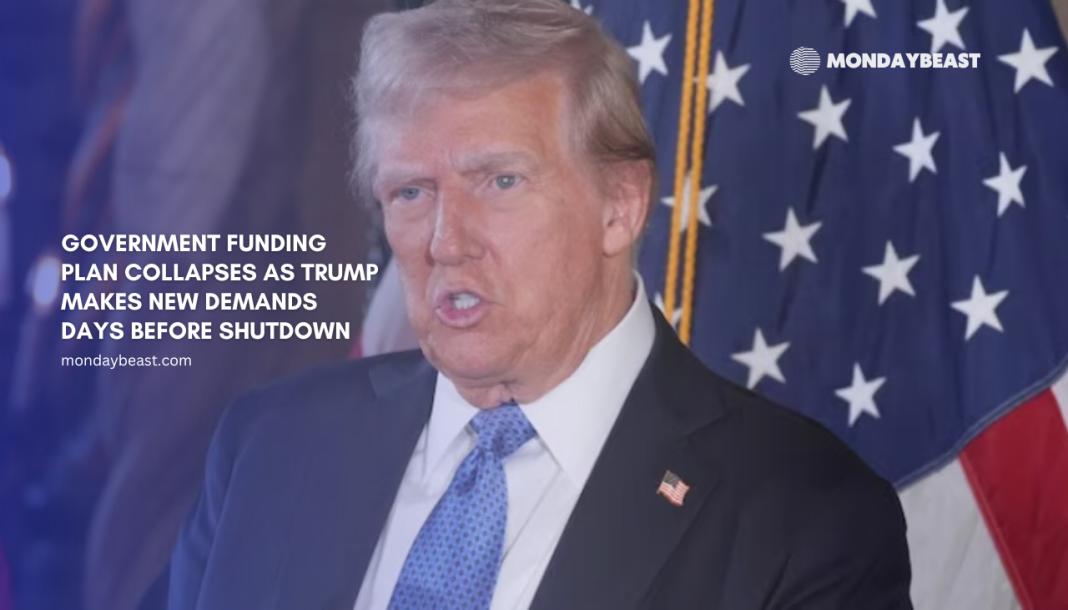Trump’s Last-Minute Demands
Just days before a potential government shutdown, President-elect Donald Trump entered the fray, abruptly rejecting a bipartisan funding plan. Lawmakers had hoped to avoid chaos and ensure smooth operations over the Christmas season. Instead, they found themselves scrambling to respond to Trump’s sudden demands.
House Speaker Mike Johnson, a leading figure in Republican efforts, was left trying to steer the party’s ship amid turbulent seas. As the deadline loomed, it became evident that Trump’s unexpected criticisms would send Congress into a tailspin. The push for new negotiations is not just about funding; it’s reflective of deeper divides within the GOP itself.

Trump’s call for a more aggressive stance echoed through the halls of Congress. “Republicans must GET SMART and TOUGH,” he stated, frustrating many lawmakers who had already forged a compromise. His insistence on including controversial measures, especially regarding the national debt ceiling, raised eyebrows.
Democratic Pushback
Democrats were quick to express their dismay at the GOP’s abrupt about-face. House Democratic Leader Hakeem Jeffries asserted that shifting positions would only hurt everyday Americans. To many, it appeared that party loyalty had overshadowed the needs of constituents.
The disaster aid, meant to support states ravaged by recent hurricanes, hung in the balance. With around $100.4 billion designated for relief, it showcased the important humanitarian aspect of the budget negotiations. Jeffries, standing firm, claimed, “an agreement is an agreement.” Such sentiments reflect the frustration felt by many citizens caught in the crossfire of partisan politics.

The GOP’s revolt seemed to place all the responsibility on Johnson and his allies. It was an all-too-familiar echo of previous power struggles within Congress. Those who watch from afar may wonder: Is this the new norm in American governance?
The Hard-Right’s Rejection
As discussions intensified, hard-right conservatives made their positions clear. Increased spending was a non-starter for them. Trump ally Elon Musk’s critical comments didn’t help either. Musk’s influence loomed large, as he spread discontent among the ranks.
In the Capitol, discontent bubbled to the surface. Lawmakers voiced their frustrations at the influx of calls from constituents urging them to reject the spending bill. Rep. Andy Barr from Kentucky noted, “My phone was ringing off the hook.” It’s astonishing how external voices can sway decisions made inside the walls of power.

Even the inclusion of disaster relief and support for farmers lagged in drawing support. The budget constraints felt by conservatives pushed them to drop necessary aid packages. Many Democrats expressed disbelief at how far the GOP was willing to go to adhere to party loyalty rather than humanitarian responsibility.
Trump’s Grip on GOP
For Johnson, solidarity with Trump is crucial. Yet, even he struggled to pivot back to party fundamentals in the wake of Trump’s turnabout. The retreat from Johnson’s original plan underscores how delicately the GOP’s future hangs on Trump’s whims.
As he navigated late-night negotiations, a sense of urgency filled the air. Trump’s demands had seemingly shifted the goals of party leaders overnight. It raises questions regarding the direction of Republican policies as the voice of one often overrides the consensus of many.
Concerns about the national debt ceiling added another layer of complexity. Trump’s insistence on raising it made negotiations tougher for Johnson. Striking a balance between maintaining party support and fulfilling fiscal responsibilities felt like a high-wire act.
Future Implications
Such developments don’t just matter for this funding bill. They signal a broader challenge for the Republican Party. Can they unify while catering to divergent views? It’s a question that won’t become irrelevant anytime soon.
As Trump wields power, many wonder what future legislation will look like—if they can achieve any at all. The GOP could potentially alienate moderates and lose sight of broader American concerns. Once a party with a rich tapestry of ideas, it may risk becoming a monolith of Trump’s vision.
Meanwhile, amid allegations of oligarchic influence, some lawmakers voiced their fears. “A handful of wealthy people run everything,” remarked Democratic Rep. Jamie Raskin. It’s hard not to see Musk’s intervention in this context.
A Complex Political Landscape
As communications continued to falter, senators across the aisle observed these developments with growing concern. “Is this going to be the norm?” questioned Sen. Josh Hawley. His trepidation hints at a worrying trend where hyper-partisanship reigns supreme, overshadowing critical issues affecting the country.
The nation stands at a crossroads. With Democrats expected to rally behind certain key provisions, a bipartisan effort may remain within reach. Yet, will their backing be enough to hold the fracturing GOP together as it navigates these treacherous waters?
Finally, the consequences of Trump’s machinations will ripple far into the future. As multiple crises loom on the horizon, Congress may need to confront the realities following this political upheaval. Time will tell if the party can reconcile its divisions or continue down a path leading to fragmentation.




